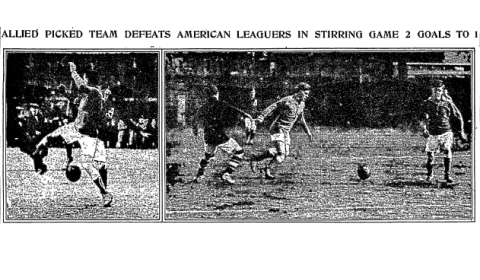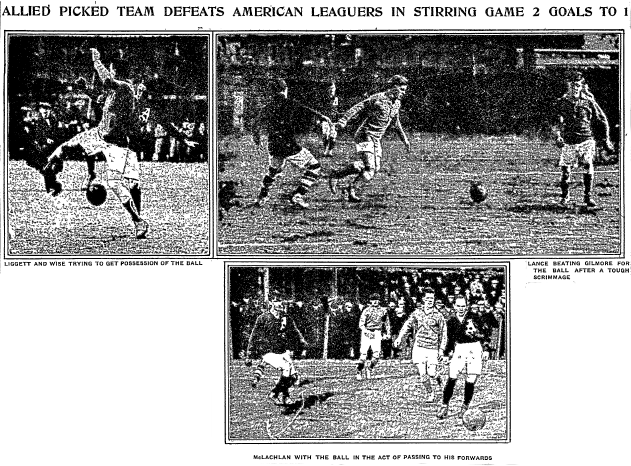2013 is the centennial of the US Soccer Federation. Our series looking back at the Philadelphia soccer scene one hundred years ago continues.
In the Jan. 13 edition of the Philadelphia Inquirer appeared an article describing a strange phenomenon. “Here of late in the last eight days there have been a greater number of serious injuries sustained on the soccer field than what has occurred in the last fifteen years, and, strange to say, the injuries have all been broken legs.” A separate article on the same day noted that Oliver Hemingway, president of the Allied American Football Association league, was attempting to organize a benefit game for one of the injured players, Ernest Thomas of Peabody.
Hemingway was to write in the 1913 edition of the Spalding Guide to Soccer Football of Thomas’s “remarkable record” before the injury, “He has played with the Peabody F.C. ever since its organization. Up to the time of the accident he had not missed a match, having played in 139 consecutive games, and was never once reported by the referee.”
On chilly and windy Feb. 1, a benefit match was held at Third and Lehigh that featured the pick of the Allied American football association against the pick of the American League, who had been soundly defeated 5–1 by a picked team from the city’s professional Pennsylvania League the week before.
This time, the American Leaguers started strongly with much of the play in the first half taking place on the Allied American’s side of the field, the American Leaguer’s “bombarding their opponent’s citadel.” Still, the Inquirer reported on Feb. 2 that the American Leaguers’ forwards “appeared all at sea” and “lacked the necessary punch when close to their opponent’s goal.”
The Allied American team scored first off of an own goal from the American Leaguers’ left back, “the ball bouncing on his back and rolling into the net.” While the American League team found an equalizer before the end of the half, instead of “infusing more life” into them, the goal “seemed to act as a tonic of the Allied players, for they started right in after that and held their own until the interval.”
The momentum shift continued after the resumption of play and the Allied team soon scored the go-ahead goal, which the Inquirer described as “one of the best witnessed on the Third street grounds this season.” The goal came from a counterattack, with Bethlehem’s Tommy “Whitey” Fleming, a future National Soccer Hall of Famer, scoring “after the frontliners had taken the ball nearly the length of the field.” The Inquirer wrote, “This feat was loudly applauded, which was well deserved.”
The match was marred by an “uncalled for and unpleasant incident” 15 minutes into the second half when Donaghy, who had previously played for Tacony and Hibernian, “completely lost his head” and deliberately tried to kick the American League right half back Richardson. The Inquirer described that Richardson “had been balking Donaghy of the ball all through the game and made him look foolish at times.” Calling the foul “one of the most flagrant incidents that the writer has witnessed in many years,” the Inquirer reported that Donaghy “had few, if any of the spectators who sympathized with him” when he was ordered off the field by the referee.
The man advantage was illusory, however, for ten minutes into the second half, the American team’s inside forward suffered an ankle injury during a scrimmage “and was practically of little use…limping around the field and was not able to run after the ball when it came his way.” He finally left the game shortly before the final whistle, this in the time when substitutions were not allowed. Before that, a chance to pull level was squandered when the American Leaguers were awarded a penalty kick after a handball in the area but failed to convert and the game ended as a 2–1 win for the Allied Americans.
While the Inquirer felt that, on the run of play, a draw would have been a fairer result, they were able to report that a large crowd had turned out for the game and that Ernest Thomas was likely to “receive a handsome benefit when all the returns for the tickets are completed.”
The benefit game was another example of the city’s growing talent pool. On Feb. 3, the Inquirer wrote, “Judging by the form of some of the players who took part in the benefit match between the two amateur organizations last Saturday, there appears to be plenty of good talent available, and everything looks promising for the sport in the next few years at least.”
 League play
League play
The benefit match meant that there were no league games for Allied American and American League teams, but there were still plenty of games in the Pennsylvania League, Cricket Club League, and United League.
In the Pennsylvania League, Hibernian continued their commanding form with what the Inquirer with some understatement referred to as “a rather decisive” 7–1 victory over Tennyson. Meanwhile, while Victors, behind the league-leading Hibs by only one point, kept with a 2–1 win over a fading Tacony.
In the Cricket League, Germantown upset reigning champions Belmont, 3–1.
In the new United League, North Philadelphia remained undefeated with a 4–1 win over Whitehall Rovers. P.H.L., who had outscored their opponents over the first two games 18 to 2, continued to demonstrate that they could score goals but showed some defensive weakness against Roxborough. Going into the start of the second half with a 3–1 lead, North Philadelphia conceded a last minute equalizer and the match finished as a 3–3 draw. In third place, Christ Church topped American Pulley Company 4–2, the Inquirer noting, “It seems odd, but both teams showed the best form when playing uphill and against the wind.”
Challenge issued
The Allied American and American League may have had no games scheduled because of the Ernest Thomas benefit match, but that didn’t mean there was no gamesmanhip. The Inquirer reported on Feb. 2 that Allied American league leaders Bethlehem had issued a challenge to American League leaders Boys’ Club for a series of matches at the end of the season to determine ‘the amateur champion of Pennsylvania.”



RECENT COMMENTS